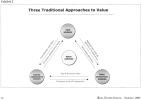I don't disagree, but cap rates and incomes are extracted directly from the market - not from a cost guide. IOW, the following is what you get from the cost guide (and assume it's accurate): TEL, local multipliers, PPF new for both improvements and outbuildings, quality rating, cost multiplier, and - depending on level of breakdown - Cost new of any components. That's a LOT of info you 'assume' to be correct (or a lot of info you're able to manipulate - depending on how you see the CA). On the IA side, how do you get cap rates? Market sales prices and market rentals, right? How do you see that as being similar to the vagaries of the CA components?


